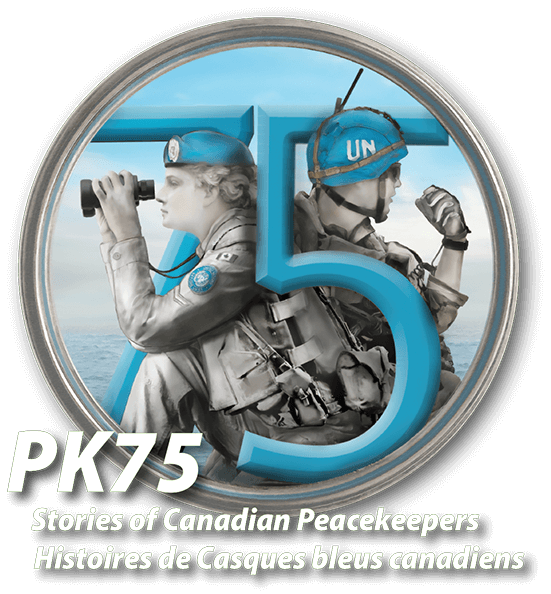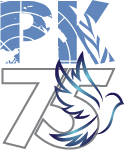


Cyprus
It was late July 1974 in Calgary when I received three-day’s notice to deploy. I would have the privilege of commanding the Lord Strathcona’s Horse Armoured Recce Troop attached to the Canadian Airborne Regiment Battle Group. Imagine getting a call, as a first-year Lieutenant, to hustle off to the Commanding Officer’s (CO) office. I quickly found out that the CO had entrusted me to muster a troop of 27 and report to Edmonton and the Airborne; we were off to war-torn Cyprus to reinforce 1 Commando (Cdo) that had already been there since the Spring.
The deployment was an extraordinary experience. Having free-reign to select those Strathconas who would deploy, my first stop on exiting the CO’s office was to see the Regimental Sergeant-Major who simply said something like “I’m on it …” He picked an amazing troop of soldiers for me. Off we went with 2 Commando and the rest of the Airborne Regiment to join 1 Cdo in Cyprus. Our Lynxs (small, three-person crew, tracked reconnaissance vehicles) arrived from 4 Canadian Mechanized Brigade Group in Lahr, West Germany. In short order, we were patrolling the Nicosia Green Line which was the dividing line between the two opposing sides, Greek Cypriot and Turkish, 24/7. We were fired on from both sides, strafed by Turkish jets, napalmed, and even had the joys of getting blown up in a minefield. Exciting times indeed!
Although the Airborne Regiment fell on difficult times years later, the unit we joined was extremely professional, well led, and well trained. But home bases being in the rival cities of Calgary and Edmonton, we had to have some friendly competition. First, we were very well supported by the Calgary Inn (now Westin) who sent us memorabilia from home. Prized were the glue-on decals of the Stampeders mustang at full charge; of course, they had to go on the sides of the Lynx’s .50 calibre mount. Secondly, the Strathconas deployed with old USAF flying suits which were de rigueur in the Strathconas. 2 Cdo’s mechanized company was instantly jealous and ordered the same. Shortly after they got their new kit, we got the new armoured corps khaki crew suit with lots of zippers; the game was on.
Although we did have this rivalry, we were truly brothers-in-arms. Firefights between the warring factions were constant and frequently occurred at night. We would deploy between the Greeks and Turks and try and get them to settle down. We did so, knowing that 2 Cdo’s Quick Reaction Force had our backs with more powerful weaponry.
Angola
Another short-notice deployment occurred in the summer of 1992. Posted as a Lieutenant-Colonel at Army HQ in St. Hubert, QC, a phone call shook me out of my afternoon musings about militia exercises. I was to be promoted and be in Angola within a month. Re-locating my family to Calgary, I started a year’s unaccompanied posting as a UN Military Observer (UNMO). After a three-day indoctrination at the UNAVEM HQ, several hours in a C-130 Hercules had me arriving at my new home, Mavinga, as the new Regional Commander. The dirt runway was surrounded by minefields.
Living in a tent in a fenced compound, literally in the bush, for five months was quite an experience. Surrounding the 50 members of my HQ was a collection of poisonous snakes (black and green mambas, cobras, etc.) and scorpions. The greatest scare however was malaria. My region was known for cerebral malaria which, without prophylactics, would be deadly within approximately 48 hours. The Canadians had been prescribed mefloquine which, taken weekly, resulted in horrific sleeps and vivid dreams. But it kept you alive.
The first time I got malaria, I was taken by a Brazilian doctor, serving with Médecins Sans Frontières, to a UNITA (guerilla faction) ‘hospital’ which was a thatched hut with one gap in the wall that provided light for the microscope. A grizzled-up guerrilla fighter had a microscope, the likes of which one would see in a museum. The Brazilian told me that if the Angolan, after viewing my blood sample, turned to me without a smile, I did not have malaria. After staring through the lens, he turned to me and started laughing. He beckoned to the Brazilian and me and sure enough, you could see the very small black dots moving outside of the blood cells. I survived that and two more bouts of that vile disease. Sadly, the country reverted to war in December, as I arrived in Luanda as the Chief of Staff. The mandate of UNAVEM became untenable and Canada withdrew its officers in March 1993. As my UN tour of duty was for one year, I continued to Uganda and Rwanda to develop plans for potential deployments and then to UN HQ until June as the African military senior staff officer.
Biography
Major-General Cam Ross (Retired) has 40 years of military service with the Canadian Armed Forces and 12 years in the private sector. His 35-years of active service was primarily in command and operational appointments.
As a United Nations Assistant Secretary-General and senior UN official in Syria, he was Force Commander of the UN Disengagement Observer Force (UNDOF) on the Golan Heights from 1998 until 2000. He was also Senior Military Advisor to the UN Secretary-General’s Special Coordinator for peace negotiations in the Middle East. He served with the UN in Cyprus during the 1974 war and in Angola, initially in the bush for five months and then as the Chief of Staff during the 1993 war. In April 1993, he was seconded to UN HQ in New York as the Africa desk officer overseeing aspects of UN peacekeeping operations in Africa; he has been to Africa frequently providing peacekeeping advice.
Senior military command appointments were at the Regiment, Formation, Division and Multi-national levels including Commander of Land Forces Atlantic Area (now 5th Canadian Division), Commander of the Combat Training Centre and CFB Gagetown NB, Base Commander of CFB Edmonton when the Army took over the Base from the Air Force to absorb units from Calgary and Chilliwack, and Commanding Officer of his armoured regiment, Lord Strathcona’s Horse (Royal Canadians) in Calgary. He served in West Germany during the Cold War with the Royal Canadian Dragoons in tank, reconnaissance, and HQ squadrons. He has held staff appointments at brigade, army, and national joint staff levels including Canadian Forces Director of Operations (J3 Ops) and Director-General International Security Policy where he oversaw multi and bi-lateral security relations and was the Senior Military Representative on the Canada-United States Permanent Joint Board on Defence. From 2010 until 2015, he proudly held the honorary appointment of Colonel of the Regiment of Lord Strathcona’s Horse (Royal Canadians).
After leaving active service, MGen Ross was President of Emergo Security and Vice-President of International Relations of Emergo Canada Ltd in Calgary, Senior Military Advisor EnCana, and President of HCR Security International Ltd which provided strategic security advice to governments and the private sector, including leading strategic multi-phase security reviews of nine Caribbean countries.
His governance undertakings have included: Chairman of the Board of the Strathcona Society; Director of the Calgary Military Museums Society; Director Canada West Military Museums; Director of the Canadian Battlefields Foundation; Military Advisor and Director for ‘No Stone Left Alone’; Governor on the Board of the Victoria Corps of Commissionaires; President of the Victoria Branch of the Canadian International Council; military advisor to ‘forces@work’ and to the Lacuna Group; and currently Director of General Magnetic International Inc. With published peer-reviewed articles, his involvement in academia has included: Executive Fellow of the School of Public Policy, University of Calgary; Fellow of the Canadian Defence and Foreign Affairs Institute; and a member of the Selection Committee of DND’s Security Defence Forum.
MGen Ross (Ret’d) started his military career at Royal Roads Military College in Victoria and graduated from the Royal Military College of Canada in Kingston in 1973. A Commander in the Order of Military Merit, he was awarded the 125th Confederation of Canada Medal, the Officer’s Cross of the Order of Merit of Poland, the Queen Elizabeth II Golden and Diamond Jubilee Medals, and the Alberta Centennial Medal, amongst other Canadian and foreign service medals and decorations. To date, MGen Ross has lived in seven countries and six Canadian provinces plus he has visited over 75 countries on military or civilian business.
Cam and his wife Patti live in Oak Bay, BC, the third generation of the Ross clan to do so. They are the very proud parents of two married sons, Angus, and Hamish.
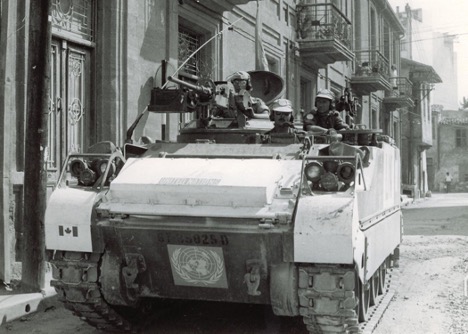
August 1974, UNFYCP Cyprus. My Lynx and crew on the Green Line in downtown Nicosia. Firefights between the opposing sides occurred frequently at night. Patrolling, broadside to both, ensured adrenalin was produced in great quantities.
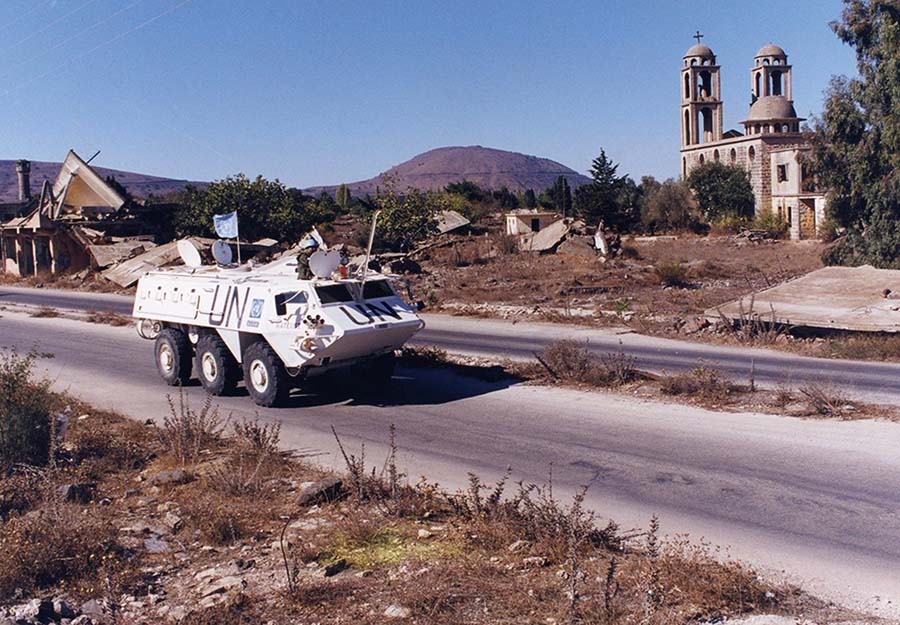
An UNDOF APC on the Syrian side in Quneitra. The hill in the background is occupied by Jewish troops of the Israeli Defence Force. The church to the right is Christian. The town was mostly Muslim. Typical for the UN to operate in the vortex of religions.
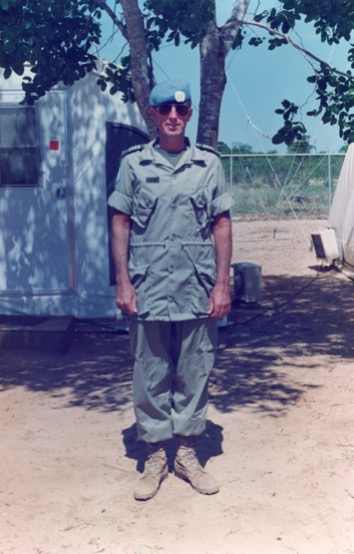
Fall 1992. Col Cam Ross; UNAVEM 2; Commander SE Region in Mavinga, Angola. The excellent huts used in the UN mission area came from Weatherhaven, Vancouver. Beyond the fence were poisonous snakes and spiders; inside, scorpions. The dirt airfield for our three-times-weekly resupply flights was surrounded by mines.


